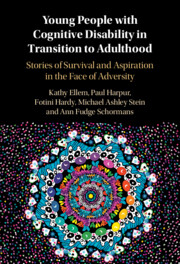 Young People with Cognitive Disability in Transition to Adulthood
Young People with Cognitive Disability in Transition to Adulthood Book contents
- Young People with Cognitive Disability in Transition to Adulthood
- Young People with Cognitive Disability in Transition to Adulthood
- Copyright page
- Dedication
- Epigraph
- Contents
- Figures
- Tables
- Preface
- Acknowledgements
- Chapter 1 Introduction
- Chapter 2 Violence against Young People with Cognitive Disability
- Chapter 3 Working in Partnership with People with Lived Experience
- Chapter 4 Amethyst’s Story
- Chapter 5 Experiences of Young People with Cognitive Disability
- Chapter 6 The Many Faces of Violence
- Chapter 7 Young People and the National Disability Insurance Scheme
- Chapter 8 Don’t Give Up on Us
- Chapter 9 Housing, Home, and Mental Well-Being
- Chapter 10 Young People’s Experiences of the Child Protection and Criminal Justice Systems
- Chapter 11 Having Someone in Your Corner
- Chapter 12 In the Voices of Participants
- References
- Index
Chapter 12 - In the Voices of Participants
What Needs to Change
Published online by Cambridge University Press: 06 February 2025
- Young People with Cognitive Disability in Transition to Adulthood
- Young People with Cognitive Disability in Transition to Adulthood
- Copyright page
- Dedication
- Epigraph
- Contents
- Figures
- Tables
- Preface
- Acknowledgements
- Chapter 1 Introduction
- Chapter 2 Violence against Young People with Cognitive Disability
- Chapter 3 Working in Partnership with People with Lived Experience
- Chapter 4 Amethyst’s Story
- Chapter 5 Experiences of Young People with Cognitive Disability
- Chapter 6 The Many Faces of Violence
- Chapter 7 Young People and the National Disability Insurance Scheme
- Chapter 8 Don’t Give Up on Us
- Chapter 9 Housing, Home, and Mental Well-Being
- Chapter 10 Young People’s Experiences of the Child Protection and Criminal Justice Systems
- Chapter 11 Having Someone in Your Corner
- Chapter 12 In the Voices of Participants
- References
- Index
Summary
Violence can happen everywhere in the lives of young people with cognitive disability. Young people with cognitive disability, family members, and workers talk about what needs to change. Services need to work together to help young people with cognitive disability. Others need to know about and respect the culture of young people with cognitive disability. Others need to respect young people’s choices on whom they want to love. Young people with cognitive disability can be helped to understand what is violence. Services can change what they do so that they can keep young people with cognitive disability safe. Young people with cognitive disability say that there should be ‘nothing about us unless it is led by us’.
Keywords
- Type
- Chapter
- Information
- Young People with Cognitive Disability in Transition to AdulthoodStories of Survival and Aspiration in the Face of Adversity, pp. 222 - 244Publisher: Cambridge University PressPrint publication year: 2025
